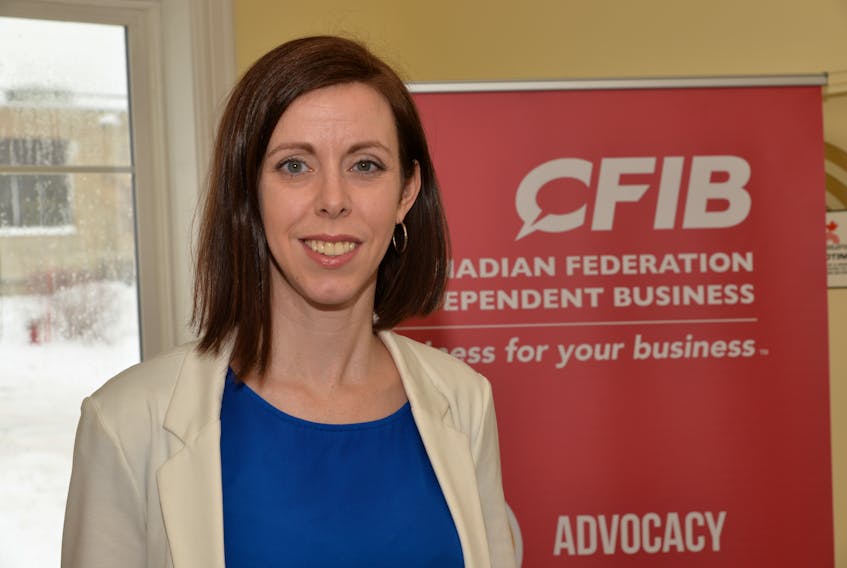CHARLOTTETOWN, P.E.I. - Erin McGrath-Gaudet has been a voice advocating for small to medium sized businesses since joining the Canadian Federation of Independent Business in Charlottetown in 2007.
She started out as a policy analyst and now is director, P.E.I. and intergovernmental policy.
McGrath-Gaudet has a bachelor of arts in sociology and anthropology from UPEI and a masters of public administration degree from Queen’s University.
Born and raised in Hunter River, she said her job with the CFIB is a great fit for a couple of reasons.
“Personally, I'm a nerd. And this is a great job for nerds,” she said. “To dig into policy issues and really trying to understand them is fun for me.”
She also grew up in a small business family, so advocating for those businesses has been a meaningful and rewarding experience.
McGrath-Gaudet sat down with The Guardian this week for a Q&A.
Q: What is working for small to medium sized businesses on the Island?
If I were to ask my members that question – what works well – is really the community aspect of P.E.I. for small businesses. They really are supported by their neighbors, by their relatives, by their friends. And especially at the community level. We don't tend to see municipal governments creating a lot of roadblocks in their community. They really are low to the ground, wanting to see the best for their community and their local economies. That's something that you can't put a price on. That's invaluable for small businesses.
Q: What needs to change?
There are challenges. We have a small scale in P.E.I. and to scale up, to compete, to grow to a level where you do have to look at going off Island, and whether that's export markets or even just neighbouring provinces. So, for a business in P.E.I. to do work throughout the Atlantic region, as an example, you have to comply with government regulations in the four provinces whereas someone in Ontario would only have to do that at one level. You start to see that it's harder to compete. All that adds costs and makes it harder for local businesses to compete. It's good that we're seeing governments taking that more seriously, but … it's hard to do. It requires governments to really roll up their sleeves and sit around a table and negotiate how we’re going to make this work – to make it easier. So, I'm encouraged that some of those conversations are happening, but it is going to be a lot of work for governments to make it smoother, just for the Atlantic region for those businesses to operate region wide.
Q: What is the CFIB looking for from the province in this year’s budget?
With provincial, we're lucky in the sense that we're at a place where we have a balanced budget. That's not something I think any of us want to or should take for granted. Because a lot of work goes into making that happen. The stage I'm at from a provincial budget perspective is really looking at how do we build on what we have right now to make next year’s budget easier, and the budget after that easier. It doesn't take much to fall back into deficit territory. A lot of the balanced budget, frankly right now, it's on the fact that we do have a strong economy. It's going much better than what we are traditionally used to in terms of growth numbers. So, if that starts to slide, it doesn't take much.
I'm looking at things like tax relief for small businesses. We've seen some movement on that, but we still certainly are not at the Atlantic average for small business tax rate. You get to the general corporate tax rate for those businesses that are bigger, we're the highest in the country. I do think there is an opportunity for us to make some movement on that. And what we see from a small business perspective is when they have money in their pockets, they are spending it. It may be that they're saving it for a rainy day or to make a bigger investment. Often, they say they're increasing employee wages when they have money in their pockets because they are competing for workers. On the tax relief side, does it go back very quickly in very productive ways in the economy? That helps set us up for success more in the future as well.
Q: An issue the CFIB has been vocal about is labour shortages on the Island. What is the issue and what is the solution?
The quick answer is that there is not an easy solution. There's a variety of challenges when it comes to the labour force. And there always has been. We're moving into an era where baby boomers are retiring ... you're losing experience and skills that for some industries are really hard to replace. Take tradespeople for example. Somebody with 30 years of building homes, you don't replace that overnight with somebody coming straight out of high school.
The other area is just a volume issue. Some of our industries have been reliant on a large seasonal workforce and the availability of a large seasonal workforce. For tourism, we've moved more and more into having a shoulder season. When students go back to school, how do you keep that operation running? It's a challenge ... we're talking about industries that are very valuable to our economy — fisheries, agriculture, tourism. I feel that we haven't really tackled that beast in terms of how we can use immigration, perhaps a little more aggressively, by looking at the temporary foreign worker programs and how we might be able to amend those to make more sense for those seasonal industries. We know there's going to be a gap in trades. Are we streaming people appropriately to that as being a career option? There's no quick and easy fix with any of it. It's going to be an ongoing struggle.
Q: Is there an issue facing small to medium sized businesses that really bothers you?
One of the areas … is really around red tape. And it can be things like government customer service — it easy to pick up the phone and talk to the right person and get the answer that you need? There can be a struggle. There's been dramatic improvements, in my opinion, to the government's website in the past couple of years. But web portals are how a lot of small businesses owners and particularly new entrepreneurs access information. Making sure those portals are up to snuff and that everything is integrated smoothly so that even if you do go through a web portal you can still pick up the phone and call.
Small business owners put a lot of time in the run of the week. They're working 40, 50, 60, 70, 80 hours a week. We can make it so that there's less time that they're putting in filling out government paperwork, looking for information (so) they don't have to call their accountant or lawyer to interpret something for them every time it pops up. That's time and money they're putting back into their businesses. I get that it's hard for government to do. It requires a level of effort and devotion to do it. But we see other jurisdictions going down this road. Nova Scotia introduced a business navigator model. So, if you're if you’re thinking about starting a business (or) you can be an existing business owner as well, you have one person who you can call and say, “OK walk me through what it is I need to do.”









